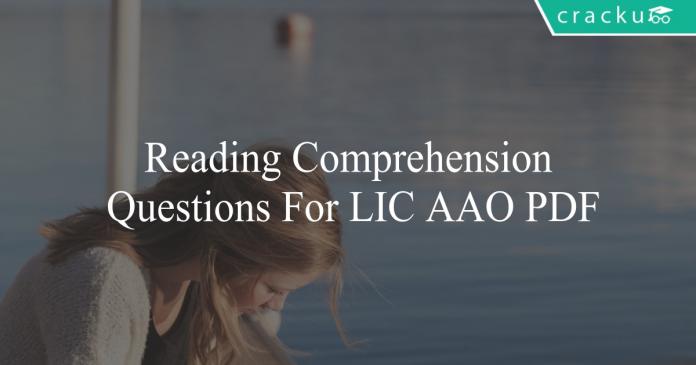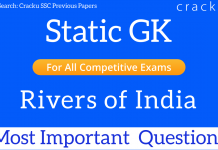Download Important Reading Comprehension questions for LIC AAO exam. Top 10 Reading Comprehension questions with answers based on previous year asked questions.
Download Reading Comprehension Questions For LIC AAO PDF
Take a free mock test for LIC AAO
Download LIC AAO Previous Papers PDF
Instructions
If Western civilization is in a state of permanent crisis, it is not far-fetched to suggest that there may be something wrong with its education. No civilization, I am sure, has ever devoted more energy and resources to organised education, and if we believe in nothing else, we certainly believe that education is, or should be, the key to everything. In fact, the belief in education is so strong that we treat it as the residual legatee of all our problems. If the nuclear age brings new danger; if the advance of genetics engineering opens the doors of new abuses; if commercialism brings new temptations, the answer must be more and better education. The modern way of life is becoming more complex: this means that everybody must become more highly educated.
“By 1984,” it was said recently, “it will be desirable that the most ordinary of men is not embarrassed by the use of a logarithm table, the elementary concepts of the calculus, and by the definitions and uses of such words as electron, coulomb, and volt. He should further have become able not only to handle a pen, and ruler but also a magnetic tape, valve, and transistor.
The improvement of communications between individuals and groups depends on it.” Most of all, it appears, the international situation calls for prodigious educational efforts. The classical statement on this point was delivered by Sir Charles (now Lord Snow in his Rede Lecture some years ago:
To say that we must educate ourselves or perish, is a little more melodramatic than the facts warrant. To say we have to educate ourselves or watch a steep decline in our lifetime, is about right. According to Lord Snow, the Russians are apparently doing much better than anyone else and will ‘have a clear edge’, unless and until the Americans and we educate ourselves both sensibly and imaginatively’. Lord Snow, it will be recalled, talked about ‘The Two Cultures and the Scientific Revolution’ and expressed his concern that ‘the intellectuals life of the whole of western society is increasingly being split into two polar groups . . . At one pole we have the literary intellectuals . . . at the other the scientists’. He deplores the ‘gulf of mutual incomprehension’ between these two groups and wants it bridged. It is quite clear how he thinks this ‘bridging’ operation is to be done; the aims of his educational policy would be, first, to get as many ‘alpha-plus scientists as the country can throw up’; second, to train ‘a much larger stratum of alpha professionals’ to do the supporting research, high class design and development; third, to train ‘thousands upon thousands’ of other scientists and engineers; and finally, to train ‘politicians, administrators, and entire community, who know enough science to have a sense of what the scientists are talking about’. If this fourth and last group can at least be educated enough to ‘have sense’ of what the real people, the scientists and engineers, are talking about, so Lord Snow seems to suggest, the gulf of mutual incomprehension between the ‘Two Cultures’ may be bridged.
These ideas on education, which are by no means unrepresentative of our times, leave one with the uncomfortable feeling that ordinary people, including politicians, administrators, and so forth, are really not much use, they have failed to make the grade: but, at least, they should be educated enough to have a sense of what is going on, and to know what the scientists mean when they talk to quote Lord Snow’s example about the Second Law of Thermodynamics. It is an uncomfortable feeling, because the scientists never tire of telling us that the fruits of their labours are ‘neutral’: whether they enrich humanity or destroy it depends on how they are used.
And who is to decide how they are used? There is nothing in the training of scientists and engineers to enable them to take such decision, or else, what becomes of the neutrality of science? If so much reliance is today being placed in the power of education to enable ordinary people to cope with the problems thrown up by scientific and technological progress, then there must be something more to education than Lord Snow suggests. Can education help us to turn the potentiality into a reality to the benefit of man? To do so, the task of education would be, first and foremost the transmission of ideas of value, of what to do with our lives. There is no doubt also the need to transmit know-how but this must take second place, for it is obviously somewhat foolhardy to put great powers into the hands of people without making sure that they have a reasonable idea of what to do with them. At present, there can be little doubt that the whole of mankind is in mortal danger, not because we are short of scientific and technological know-how, but because we tend to use it destructively, without wisdom. More education can help us only if it produces more wisdom.
The essence of education, I suggested, is the transmission of values, but values do not help us to pick our way through life unless they have become our own, a part, so to say, of our mental make-up. This means that they are more than mere formulae or dogmatic assertions: that we think and feel with them, that they are the very instruments through which we like and interpret, and experience the world. When we think, we do not just think: we think with ideas. Our mind is not a blank, a tabula rasa. When we begin to think we can do so only because our mind is already filled with all sorts of ideas with which to think. All through our youth and adolescence, before the conscious and critical mind begins to act as a sort of censor and guardian at the threshold, ideas seep into our mind, multitudes of them. These years are, one might say, our Dark Ages during which we are nothing but inheritors; it is only in later years that we can gradually learn to sort out our inheritance. First of all, there is language. Each word is an idea. If the language which seeps into us during our Dark Ages is English, our mind is thereby furnished by a set of ideas which is significantly different from the set represented by Chinese, Russian, German, or even American. Apart from words there are the rules of putting them together: grammar, another bundle of ideas, the study of which has fascinated some modern philosophers to such an extent that they thought they could reduce the whole of philosophy to a study of grammar. All philosophers and others have always paid a great deal of attention to ideas seen as the result of thought and observation; but in modern times all too little attention has been paid to the study of the ideas which form the very instruments by which thought and observation proceed. On the basis of experience and conscious thought small ideas may easily be dislodged, but when it comes to bigger, more universal, or more subtle ideas, it may not be so easy to change them. Indeed, it is often difficult to become aware of them, as they are the instruments and not the result of our thinking just as you can see what is outside you, but cannot easily see that with which you see, the eye itself.
And even when one has become aware of them it is often impossible to judge them on the basis of ordinary experience. We often notice the existence of more or less fixed ideas in other people’s minds — ideas with which they think without being aware of doing so. We then call them prejudices, which is logically quite correct because they have merely seeped into the mind and are in no way the result of judgement. But the word prejudice is generally applied to ideas that are patently erroneous and recognisable as such by anyone except the prejudiced man. Most of the ideas with which we think are not of that kind at all. To some of them, like those incorporated in words and grammar, the notions of truth or error cannot even be applied, others are quite definitely not prejudices but the result of a judgement; others again are tacit assumptions or presuppositions which may be very difficult to recognise. I say, therefore, that we think with or through ideas and that what we call thinking is generally the application of pre-existing ideas to a given situation or set of facts. When we think about, say the political situation.
we apply to that situation our political ideas, more or less systematically, and attempt to make that situation’ ‘intelligible’ to ourselves by means of these ideas. Similarly, everywhere else we evaluate the situation in the light of our value-ideas. The way in which we experience and interpret the world obviously depends very much indeed on the kind of ideas that fill our minds. If they are mainly small, weak, superficial, and incoherent, life will appear insipid, uninteresting, petty and chaotic. It is difficult to bear the resultant feeling of emptiness, and the vacuum of our minds may only too easily be filled by some big, fantastic notion-political or otherwise — which suddenly seem to illumine everything and to give meaning and purpose to our existence. We feel that education will help solve each new problem or complexity that arises. It needs no emphasis that herein lies one of the great dangers of our times. When people ask for education they normally mean something more than mere training, something more than mere knowledge of facts, and something more than a mere diversion.
Maybe they cannot themselves formulate precisely what they are looking for; but I think what they are really looking for is ideas that could make the world, and their own lives, intelligible to them. When a thing is intelligible you have a sense of participation; when a thing is unintelligible you have a sense of estrangement. ‘Well, I don’t know’, you hear people say, as an impotent protest against the unintelligibility of the world as they meet it. If the mind cannot bring to the world a set — or, shall we say, a tool box — of powerful ideas, the world must appear to it as a chaos, a mass of unrelated phenomena, of meaningless events. Such a man is like a person in a strange world and without any signs of civilization, without maps or signposts or indicators of any kind. Nothing has any meaning to him; nothing can hold his vital interest; he has no means of making anything intelligible to himself.
Question 1: The writer’s contention in the passage is that the crisis in Western civilization can be explained by
a) the presence of some flaws in its education.
b) some inherent lack of coordination among its various elements.
c) some basic misunderstanding in its society.
d) the energy it has devoted to education.
Question 2: According to the writer, Lord Snow sees the intellectual life of Western society as split between
a) the educated and the uneducated.
b) the government servants and the plebeians.
c) scientists and literary intellectuals.
d) administrators and intellectuals.
Question 3: The writer seems to criticise the belief that
a) education gives rise to further complexities as civilization progresses.
b) all new problems and complexities can be tackled and solved by more and better education.
c) people need to learn more in order to earn more.
d) None of these
Download LIC AAO Previous Papers PDF
100 Free Computer Awareness Tests for LIC
Question 4: What, according to the author, would be the definition of ‘prejudice’?
a) Ideas that help people to identify with new situations.
b) Fixed ideas with which people think without being aware of doing so.
c) Ideas that people cull from experience in order to judge a situation.
d) Fixed ideas that see a person through the trials and tribulations of life.
Question 5: According to Lord Snow, which of the following groups needs to be educated enough to at least understand the works of scientists and engineers?
a) Politicians, administrators, and the entire community
b) Politicians and literary intellectuals
c) Politicians and the layman
d) All of these
Question 6: In the passage, the writer questions
a) the neutrality of science.
b) scientists’ stand on the neutrality of science.
c) scientists’ stand on the neutrality of their labours.
d) Lord Snow’s assertion regarding the potential of intellectuals in society.
Question 7: The author’s assertion in the passage is that education’s main responsibility is to
a) transmit ideas of value.
b) transmit technical knowledge.
c) Both a and b
d) transmit the values regarding human and societal norms.
100 Free GK Tests for Insurance Exams
Question 8: The author believes that
a) the gulf between science and literature needs to be bridged.
b) ideas should be maintained for a holistic view of society and its problems.
c) words are not ideas.
d) None of these
Question 9: Which of the following sentences is not true according to the author?
a) Values must be part of one’s psyche.
b) Values are merely dogmatic assertions.
c) One identifies with values.
d) Values are the means to interpret and experience the world.
Question 10: Thinking is
a) being.
b) knowing.
c) application of pre-existing ideas to a situation.
d) application of fixed ideas to a situation.
LIC AAO REASONING QUESTIONS PDF
Answers & Solutions:
1) Answer (A)
Refer to the first sentence of the passage: “In Western civilization is in a state of permanent crisis, it is not far-fetched to suggest that there maybe something wrong with its education”. So, the writer’s contention is that the crisis in the Western civilization can be explained by the presence of some flaws in its education. Option a) is the correct answer.
2) Answer (C)
Refer to the following sentences: “Lord Snow, it will be recalled, talked about ‘The Two Cultures’…at the other the scientists”. So, according to Lord Snow, the intellectual life of the Western society is split between the scientists and literary intellectuals”. Option c) is the correct answer.
3) Answer (B)
Refer to the first few lines of the paragraph:”If Western civilization is in a state of permanent crisis, it is not far-fetched to suggest that there may be something wrong with its education. No civilization, I am sure, has ever devoted more energy and resources to organised education, and if we believe in nothing else, we certainly believe that education is, or should be, the key to everything. In fact, the belief in education is so strong that we treat it as the residual legatee of all our problems.” Here the author criticises our view when we consider the solutin of some problem as more education.
4) Answer (B)
Consider the following sentences: “We often notice the existence of more or less fixed ideas in other people’s minds – ideas with which they think without being aware of doing so. We then call them prejudices”. So, a prejudice is a fixed idea with which people think without being aware of doing so. Option b) is the correct answer.
5) Answer (A)
The author quotes Lord Snow in the passage: “and finally to train politicians, administrators, and entire community…”. Option a) is the correct answer.
6) Answer (C)
Refer to the following sentences in the passage: “It is an uncomfortable feeling, because scientists never tire of telling us …becomes of the neutrality of science”. In these sentences, the writer is questioning the scientists’ stand on the neutrality of their labours. Option c) is the correct answer.
7) Answer (A)
Refer to the following sentence: “The essence of education, i suggested, is the transmission of values…”. So, according to the author, the main responsibility of education is to transmit ideas of value. Option a) is the correct answer.
8) Answer (D)
Refer to the following sentences: “These ideas on education, which are by no means unrepresentative of our times, …Second Law of Thermodynamics”. From these sentences, we can understand that the author is not of the opinion that the gulf between science and literature needs to be bridged. Also, there is nothing in the passage to suggest that the author believes that ideas should be maintained for a holistic view of society and its problems or that words are not ideas.
Option d) is the correct answer.
9) Answer (B)
Refer to the following sentences: “The essence of education, I suggested, … more than mere formulae or dogmatic assertions..”. From these sentences, we understand that according to the author, values are not merely dogmatic assertions”. Option b) is the correct answer.
10) Answer (C)
Refer to the following sentence: “I say, therefore, that we think with or through ideas and that what we call thinking is generally the application of pre-existing ideas to a given situation or set of facts”. So, thinking is an application of pre-existing ideas to a situation. Option c) is the correct answer.





